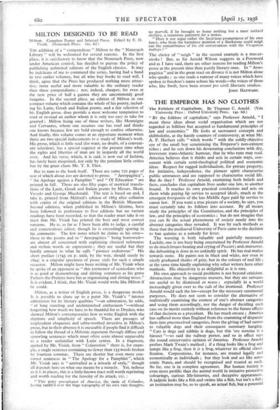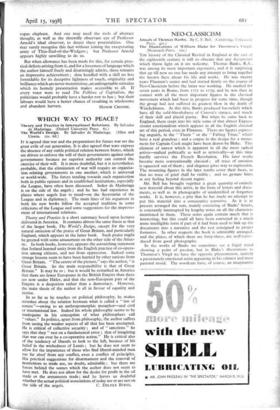THE EMPEROR HAS NO CLOTHES
The Folkloire of Capitalism. By Thurman C. Arnold. (Yale University Press : Oxford University Press. 14s. 6d.)
" BY the folklore of capitalism," says Professor Arnold, " I mean those ideas about social organisation which are not regarded as folklore but accepted as fundamental principles of law and economics." He looks at sacrosanct concepts and shibboleths, at the handy counters of controversy, at what Mr. A. P. Herbert calls " witch words " with the coldly objective eye of the small boy scrutinising the Emperor's non-existent robes ; and he sets down his devastating conclusions with dry, irreverent trans-Atlantic humour, that he who runs may read. America believes that it thinks and acts in certain ways, con- sonant with certain semi-theological political and economic ideas. Respect for rugged individualism, for private property, for initiative, independence, the pioneer spirit characterise public utterances and are supposed to characterise social life. But do they ? Professor Arnold, examining both beliefs and facts, concludes that capitalism lives under one law, to another bound. It reaches its own practical conclusions and acts on them while paying lip service to accepted ideals, much as the emergent bourgeoisie of the late Middle Ages paid lip service to canon law. If you want a true picture of a society, he says, you must certainly take its folklore into account. By all means study the principles of the Constitution, and the principles of law, and the principles of economics ; but do not imagine that you can fit the actual phenomena of society neatly into the abstract categories thus revealed. It was by such methods as these that the mediaeval University of Paris came to the decision to ban quinine as a remedy for fever.
The warning is both valuable and painfully necessary. Luckily, one is too buiy being entertained by Professor Arnold to do much-breast-beating and crying of Peccavi; and, moreover, the debunking is done in no unkindly spirit. He has real malice towards none. He paints not in black and white, nor even in nicely graduated shades of grey, but in the colours of real life ; at the same time kindly explaining why other writers have other methods. His objectivity is as delightful as it is rare.
His own approach to social problems is not beyond criticism. Abstractions may be dangerous masters, but they are servants too useful to be dismissed en masse ; especially in a world increasingly given over to the cult of the irrational. Professor Arnold would sack the lot—except for the necessary ceremonial purposes. He does not seem to consider the alternative of realistically examining the content of one's abstract categories and using them accordingly, nor the danger of deciding each case on its merits entirely without reference to the future effects of that decision as a precedent. He has much excuse ; America has suffered more than England front the cramming of disparate facts into preconceived categories, from the giving of bad names to valuable dogs and their consequent summary hanging. " Cats is dogs and rabbits is dogs, but this 'ere tortoise is a hinsect "—so said the railway porter, and so in effect says the sound conservative opinion of America. Professor Arnold prefers Mark Twain's method ; if a thing looks like a frog and jumps like a frog, then it is a frog, whatever its official classi- fication. Corporations, for instance, are treated legally and economically as individuals ; but they look and act like auto- cratic States, and should be recognised and treated as such. So far, one is in complete agreement. But human society is even more prolific than the animal world in imitative protective colourings, curious life-histories, and deceptive appearances. A tadpole looks like a fish and swims like a -fish, but isn't a fish; an institution may be, so to speak, an actual fish, but a potential
rogue elephant. And one may need the tools of abstract thought, as well as the shrewdly observant eye of Professor Arnold's ideal observer, to detect these potentialities. One may surely recognise this fact without joining the exasperating army of Thin-End-of-the-Wedgers ; but Professor Arnold appears highly unwilling to do so.
But when allowance has been made for this, for certain prac- tical defects arising from it, and for a looseness of language which the author himself freely and disarmingly admits, there remains an impressive achievement ; data handled with a skill no less formidable for its deceptive lighmess of touch, originality and brilliance which are never meretricious, an unforgettable stimulus which its homely presentation makes accessible to all. If every voter were to read The Folklore of Capitalism, the politicians would probably have a harder row to hoe ; but their labours would have a better chance of resulting in wholesome







































 Previous page
Previous page